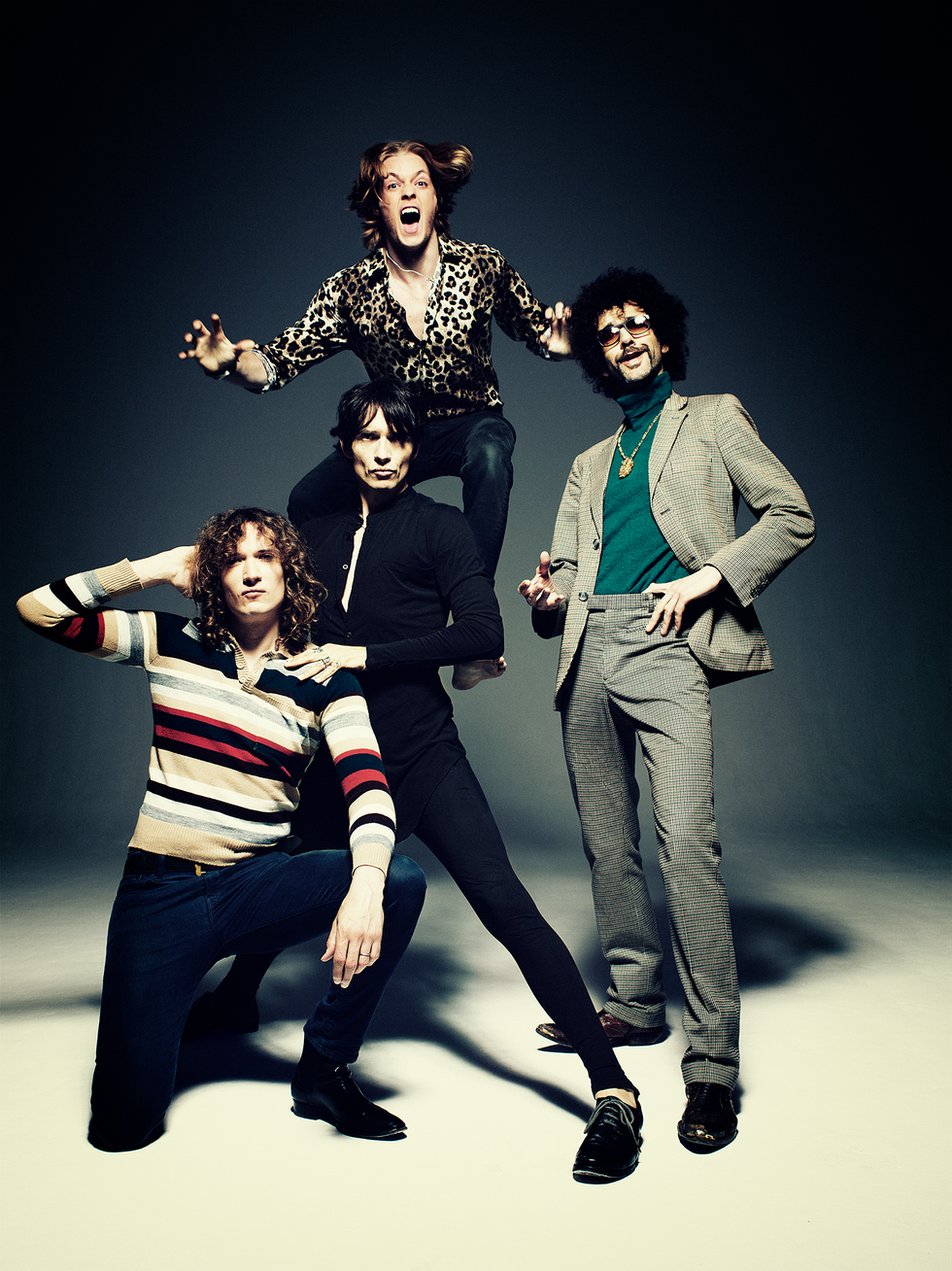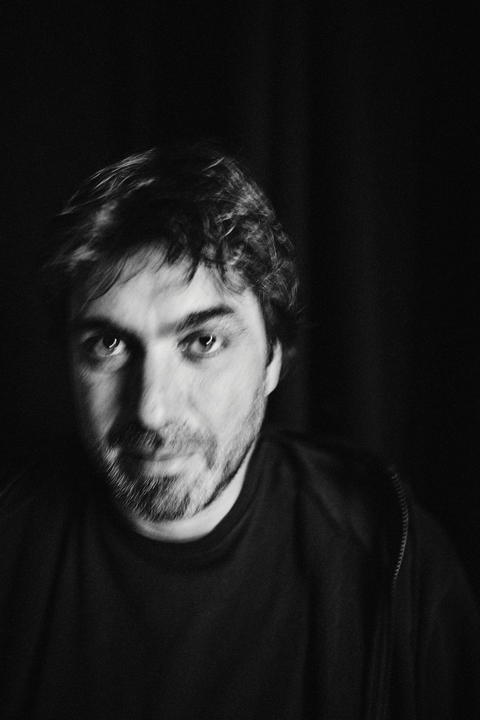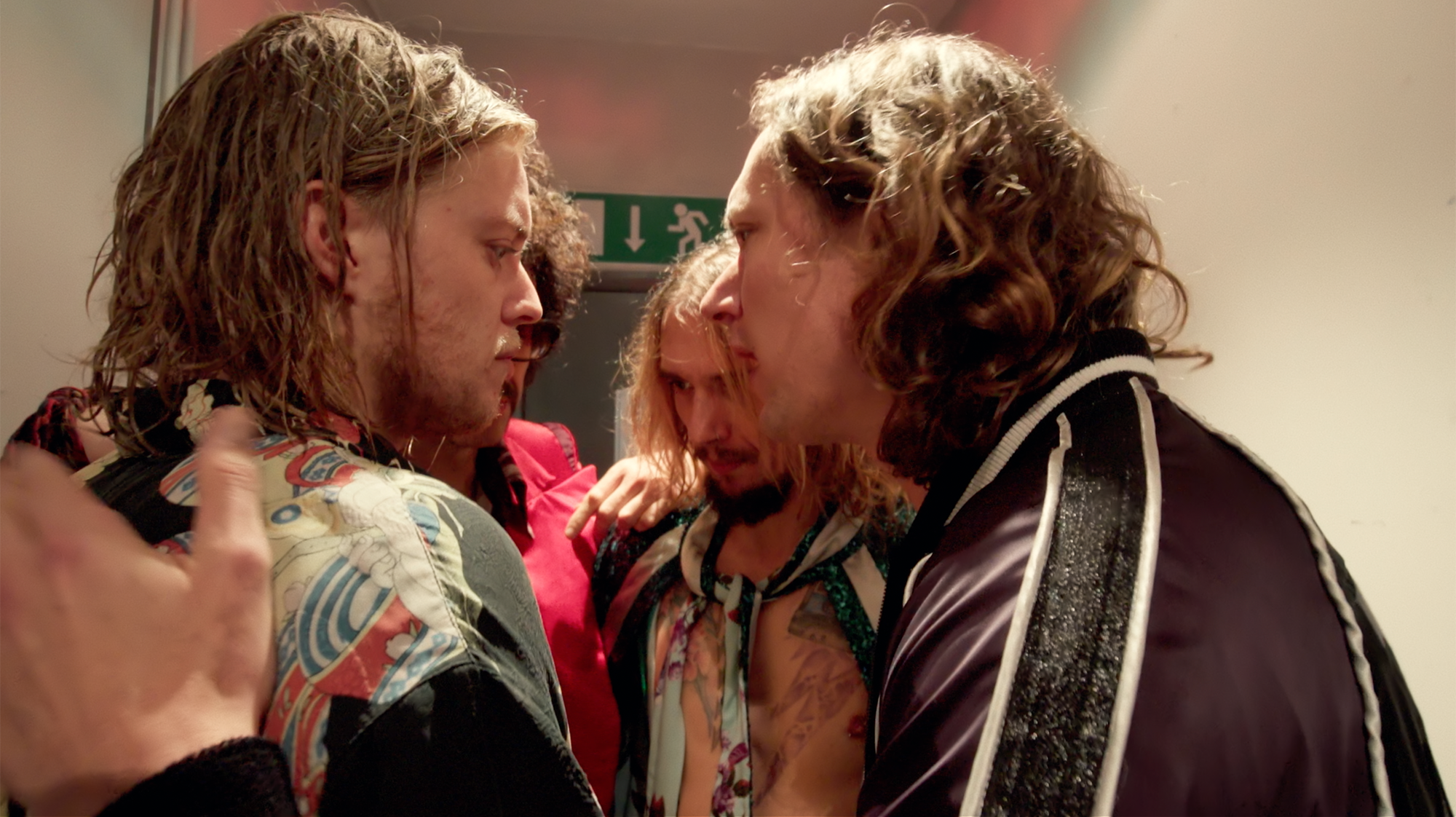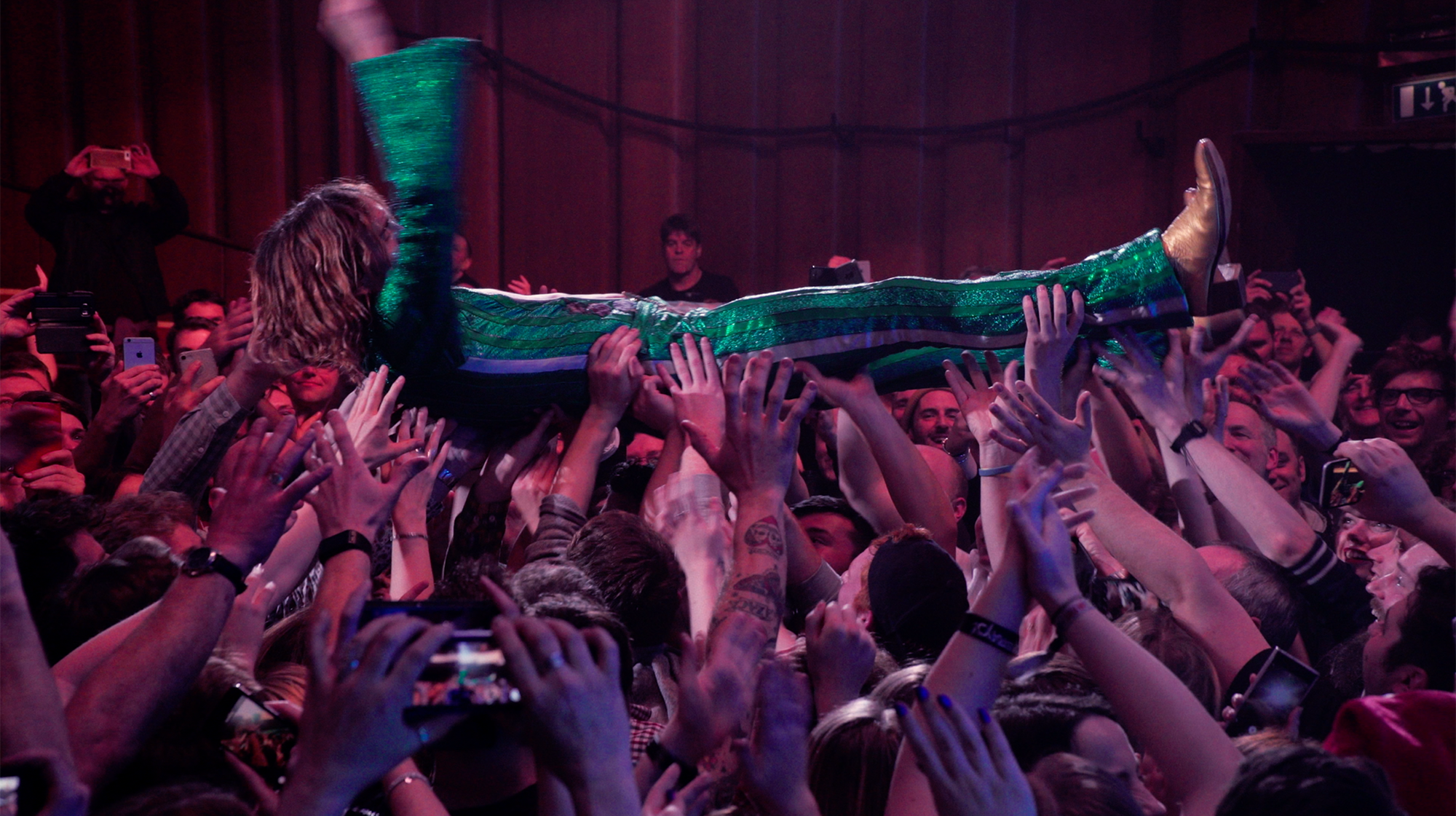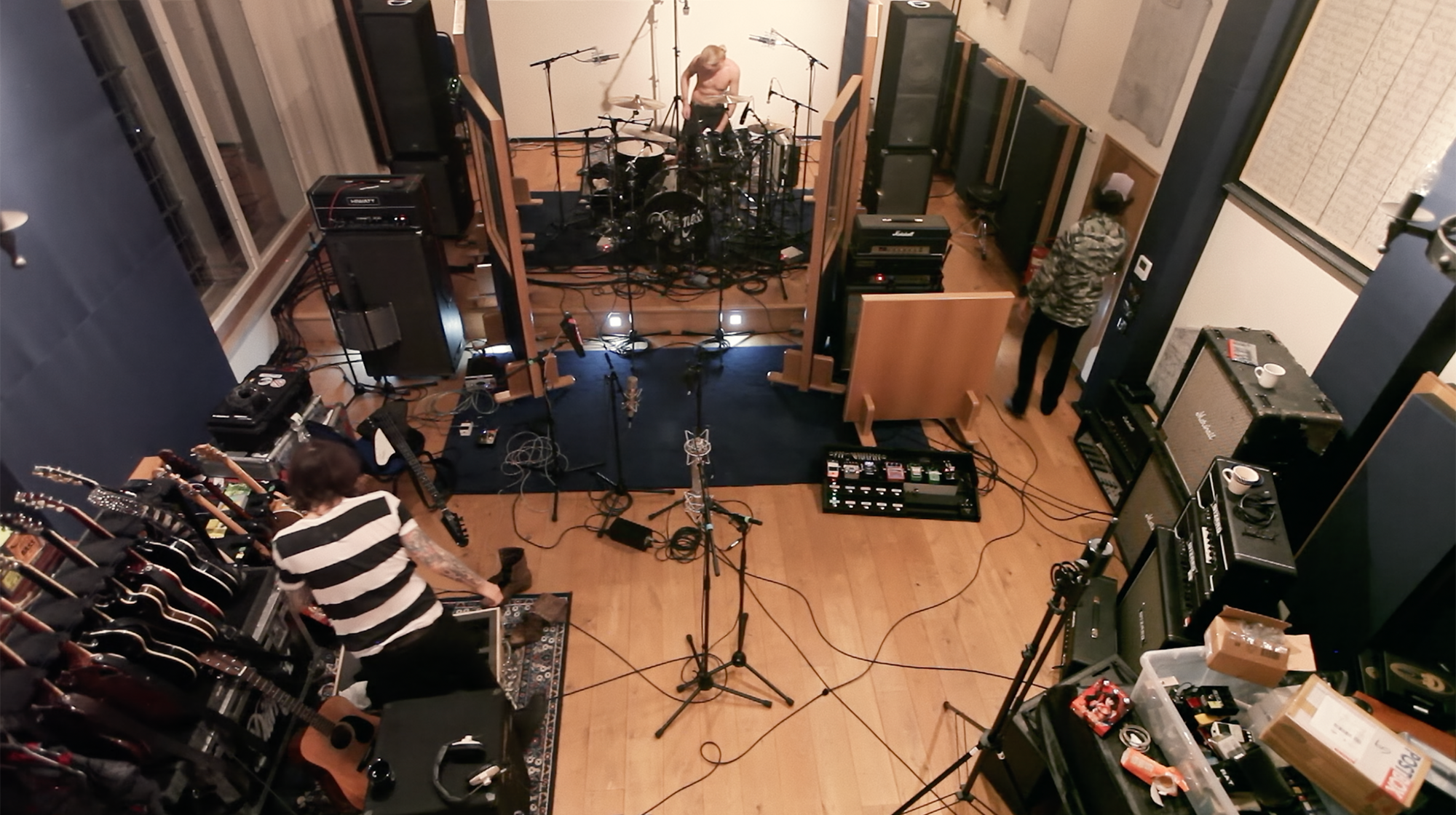Precisely 20 years ago, The Darkness were the biggest band in Britain — confoundingly, magnificently, and briefly. Formed in 2000 in Lowestoft, Suffolk, not traditionally a hotbed of world-frotting rock deities, by brothers Justin (vocals) and Dan Hawkins (guitar), they released their debut album, Permission to Land, in the summer of 2003. It was, in the words of Justin Hawkins, a “megasmash”.
On the back of an irresistible single, “I Believe in a Thing Called Love” — “a massive, monumental, rock-classic superhit” (Justin again) — the LP went to number one, sold 1.4m copies, won three Brit awards, including best group and best album and, briefly, made the brothers and their bandmates (bassist Frankie Poullain and original drummer Ed Graham, the first of four) world-famous. Everything had gone “horribly right” (Justin again).
Flamboyant throwbacks to the long-gone, even then, days of hair metal, cock rock, glam and every other daft and discredited (but fun!) genre of hard rock, The Darkness, depending on who one chose to believe at the time, were either a bombastic corrective to the po-faced earnestness of Nineties alt-rock, a sort of anti-Radiohead, or they were a joke, a camp pastiche of the excesses of 1970s and 1980s guitar heroes. (Neither position accounted for the fact that they could possibly be both.) The riffs were epic, the lyrics were preposterous, the pyrotechnics were spectacular, the costumes were insane. As frontman, Justin Hawkins appeared to be simultaneously channelling Robert Plant, Freddie Mercury, Steven Tyler — and Dame Edna Everage.
Three years after Permission to Land took off, Justin was in rehab for addictions to alcohol and cocaine, and The Darkness had been dropped by their record label. They’d flown too close to the spotlights and become the cliché they were both satirising and celebrating. After the band officially split in 2006, the Hawkins brothers didn’t speak for years.
What happened next, and in the years following their fall from grace, as the band came back together and attempted to re-bottle lightening, is the subject of Welcome to the Darkness, a beautifully observed, funny and unexpectedly moving new documentary from British photographer and director Simon Emmett.
Almost a decade in the making (Emmett first talked to the band about working with them on a film in 2014, and he began shooting shortly afterwards), Welcome to the Darkness ticks some of the boxes of a traditional rockumentary — archive footage from the band’s imperial phase; rueful interviews about the aftermath; fly-on-the-wall reportage from the attempted comeback — but the resulting movie is by no means generic. This is an exceptionally intimate film, distinguished by Emmett’s elegant, deadpan style and his conscientious reluctance to hit the easy beats.
As a result, what could have been just another hackneyed tale of rock-star overindulgence becomes something richer and infinitely more appealing: a portrait of resilience, hope and brotherhood. It’s also an opportunity to watch a best man’s speech in which a testicle glove puppet performs a Spice Girls solo.
“I never wanted this to be a traditional rock doc,” Emmett tells me on a Zoom call in September. “There is a formula to those and it’s very tempting to slip into it. I wanted to make a film about the people, rather than ‘the band’. The vehicle that brought them together and held them together was The Darkness, but for me it was about the people inside that. I hope that comes across.”
Emmett’s name will be familiar to regular readers of Esquire from his byline on countless celebrity portraits. In the decade that he has been working on and off on Welcome to the Darkness, he has also found time to photograph more than 20 covers for this magazine, as well as countless advertising campaigns for luxury brands, and album covers for stars including Adele and Kylie Minogue.
But he also has form as a director. Underhill, his first film, from 2013, was a deeply reported, charming and witty portrait of the characters associated with Emmett’s local football team, Barnet FC, from the chairman to the fans. “I don’t think we mentioned the name of a single player,” he says.
It was following a screening of that film in Soho, central London, that The Darkness suggested Emmett might like to make them his next subject.
“Everyone remembered them, but no one had a clue what had happened to them,” Emmett says now. “When we started, they were doing a pub tour in Ireland. It quickly became apparent that they were great material: really compelling, unusual people. And I just decided to keep going until, eventually, it became like a game of poker, where you’re so far in you can’t pull out. So, yes, it was a gamble. There wasn’t a lot of logic to it.”
For most of the making of the film, Emmett was funding the production himself, with no idea of whether he would ever be able to sell it.
“Looking back, I don’t really know what the hell I was thinking,” he says. “I’m glad I stuck with it, but there were so many reasons to have bailed. I put a lot of money in and I put a lot of time in. It was a leap of faith. If [the band] hadn’t been as collaborative as they were, and if I hadn’t believed they were as into it as I was, then it could never have worked.
“It took a few years for them to start to really open up,” he continues. “But, finally, you get to a point where they don’t even acknowledge you’re there. You’re part of the scenery. Which is where you want to be.”
An unassuming, 54-year-old north-Londoner, almost pathologically self-effacing (many photographers are themselves camera-shy; this one is camera-terrified), Emmett has spent much of his working life around world-famous subjects, making them look beautiful, sexy, cool.
“I love what I do,” he says. “But when people are right at the top you don’t often have the freedom to do authentic storytelling, because of the layers of management and PR and studios and record labels and all the rest of it. There’s so much control. Whereas these guys were an open book. At one stage they actually asked if I could make them look worse.”
The beginning of Welcome to the Darkness, then, finds the band playing “intimate” (tiny) venues to “crowds” (clusters) of slightly bemused onlookers. Justin is now sober — much of his free time seems to be spent running in the rain — but, it will turn out, he has lost none of his absurdist wit or bracing honesty. Dan, the more grounded of the Hawkins brothers, has his own eccentricities: at one point we are treated to a tour of his collection of agricultural equipment. The Zen-like Frankie, a dapper Scot with microphone hair, remains, in Dan’s words, a “total enigma”. An experiment with a young female drummer comes to nought before a new permanent member, the apparently preternaturally upbeat Rufus Tiger Taylor (son of Roger, of Queen fame), completes the current line-up.
For all the Spinal Tap-style comic potential in any film about a once-famous rock group, it’s Emmett’s refusal to go for the easy laugh that gives his film its heart. Welcome to the Darkness is frequently hilarious, but never mean-spirited. Sentimental, but not mawkish. Intimate, but not exploitative. Revealing, but not sensational.
“There were so many incarnations of the film as we went along,” Emmett says, “because we had so much material and, yes, it would have been easy to tip over the edge into parody. You have to draw that very delicate line so it’s not hurtful to them but has integrity as a film. I didn’t want to throw them under a bus.
“In the film world,” he continues, “people are only interested in the narrative. They want the drama and the blood and guts to drive the story. But the band wanted a quirky character study, which is exactly what I wanted.”
He got the drama and the blood and guts anyway. About an hour into the film, as things are starting to look up for the band — bigger crowds in bigger venues — Justin suddenly loses the ability to sing the high notes that define the sound of The Darkness. We watch all this unfold in what feels like real time. A medical investigation discovers polyps on Justin’s vocal chords. He will need to have an operation. If it doesn’t work, The Darkness will be no more.
Before that, “I remember being on [former Sex Pistol] Steve Jones’s radio show in LA with them,” says Emmett. “[Jones] asked who I was. And Dan said, ‘Oh, he’s just waiting for one of us to die.’ Which wasn’t true, but there was a sense that something needed to happen. Otherwise, where was the jeopardy?”
But even without the medical emergency, the story has the all the elements of a classic three-act drama. “They had it all and they lost it all, and they want some of it back,” says Emmett. “That, to me, is interesting. I think all of us have a fascination with fame, and with success and failure.” His personal fascination with the topic is born, at least partly, from his own shrinking from the spotlight.
“My biggest fear would be to be famous,” he says. “The idea that you can no longer walk down the road to the shop: why would you want that? And if [as in Justin’s case] it nearly kills you the first time, why would you want it a second time?”
Has he been able to answer that question? “Certain people, the real genuine articles, just have a higher level of charisma,” he says, “and I think becoming famous is part of the deal in order to deliver what they want to deliver as artists. You can’t be a rock star without being famous. I don’t know whether they calculate that on the way up. I think what happens is the passion drives it at the start and then, once you’re successful, it’s too late to go back.”
For a number of years, Emmett struggled to interest production companies and distributors in Welcome to the Darkness. “Everything came down to money,” he says. “People [in the industry] were like, ‘We love it, but it’s not Led Zep, it’s not Coldplay. It’ll never make the numbers.’ And you do get this fear that it’s not going to happen.”
Three years ago, a saviour arrived in the guise of Fulwell 73, a renowned British production company with a strong track record in documentary. “It was quite traumatic trying to get it over the finish line,” Emmett says, “but I’m very, very grateful and I know how lucky I am to have got a self-funded, home-made documentary out into the mainstream through a company with that profile. I’m well aware that the vast majority of films like that never get seen.”
Which would have been a shame, and not just for Emmett and the band. Because, fittingly, given its subject, Welcome to the Darkness is nothing if not entertaining. The pronouncements of Justin Hawkins alone are worth the price of admission.
“The worse I was,” Justin tells Emmett of his behaviour when the band were at their peak, “the more intolerably unprofessional, unlikeable, just a massive arsehole, the more successful we were. There was a definite correlation between my abuse of everything and everybody around me, and the success of the band.”
“I think I lost my mind,” he says at another point. “It took me years to recover. And I don’t think I’m there yet.”
I wondered if, after all this time in their company, Emmett has solved the puzzle: are The Darkness for real, or are they having a laugh?
“They are deadly serious musicians,” Emmett says. “But they don’t believe that has to mean that you can’t have fun with it. There’s a side of them that wants to be superstars. And this other side, the kind of parody side, that wants to undercut all of that.
“There’s a defiance to their attitude, which I admire,” he adds. “I think it’s fuelled by their initial success. Back then, they were like, ‘We’re not young, we’re not good-looking enough, we’re not cool. We really shouldn’t be famous, but we’re going to be anyway.’ They believed in themselves. And I think they believe it this time round, too. And, actually, they’re doing it again. The music landscape is so different now that you don’t necessarily hear about it, but they supported Guns N’ Roses, they’re hitting big numbers now, they’re back to playing arenas. In the last year or two, they have really rebuilt their fanbase.”
The release of Welcome to the Darkness follows the recent all-bells-and-whistles rerelease of Permission to Land (inevitably retitled Permission to Land… Again), and anticipates a show at London’s Roundhouse on 7 December, surely a perfect opportunity to dust down the band’s seasonal classic, “Christmas Time (Don’t Let the Bells End)”. As with so much of the best pop culture, this will likely provoke strong reactions; equal parts misery, mirth and merriment.
“I’ve probably upset about half the people I’ve met in my life,” says Justin Hawkins, in the film. “And the other half I’ve… delighted.” ○
“Welcome to the Darkness” will be in cinemas from 9 November, and available digitally from 4 December.
